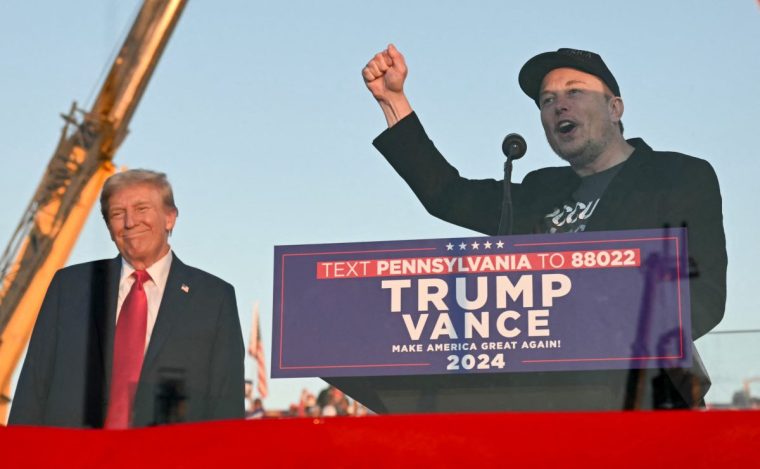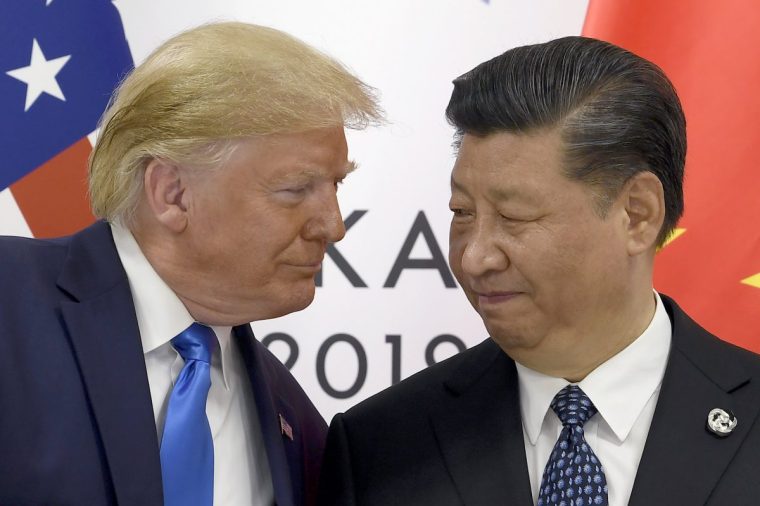Ministers have been warned not to “bow to the will” of American tech giants to appease Donald Trump amid threats from his team to withhold US co-operation if social media firms are too heavily regulated.
The Republican’s presidential election win has sent shockwaves through UK politics and left countries around the world questioning what price they may have to pay in return for avoiding tariffs or securing continued American involvement in Nato and other areas.
Public statements and analysis by foreign policy experts for i suggest Trump, seen as a highly transactional leader, may demand the UK and other allies join the US in a trade war with China, hike defence spending, or buy American military hardware to swerve tariffs, ensure Washington’s continued backing for Ukraine and obtain other favourable treatment.
Campaigners also fear that the UK will take a more relaxed approach to regulating tech giants like social media company X, which is owned by Elon Musk, a close ally of Trump who has been given a key role in his incoming administration.
These concerns have been fuelled by comments from the likes of vice president-elect JD Vance, who in September suggested the US could pull out of Nato due to EU regulation of X and other social media, while Trump said in his election victory speech this month that Musk was a “super genius”, adding: “We have to protect our geniuses.”
On Friday, Labour peer Lord Peter Mandelson, who is one of the frontrunners to become the next UK ambassador to the US, said that Musk simply had “too big a footprint in too many industries” to ignore and that the Labour government should “redouble” its efforts to connect with him.
UK Technology Secretary Peter Kyle’s warning this week, in the wake of Trump’s victory, that global tech firms are now so big and powerful that they should be treated like nation states has compounded concerns.

Kyle in July committed to “building on the Online Safety Act”, a landmark piece of legislation that forces social media firms to keep children safe on the internet or face punishments including heavy fines or having their access in the UK blocked. It has faced fierce lobbying from tech giants.
But the Cabinet minister told a conference this week, while discussing tech giants: “I can’t sit here in my office in Whitehall and instruct that world to do what I want it to do as secretaries of state have been able to do in the past.”
His comments drew criticism from campaigners.
Baroness Kidron, a crossbench peer and founder of the 5Rights children’s rights foundation, told i that Trump’s election should not slow the pace of tech regulation.
She said: “The characterisation of a close UK/US at any cost is extremely short sighted.
“The decisions we make about tech governance, the protection of our valuable creative industries and harnessing our unique sovereign data assets such as the NHS will impact the future prosperity and independence of the country and the wellbeing of its citizens well beyond any US administration or indeed UK government.
“There are rich rewards for the UK if we carve our own path, a failure to do so, will be a colossal mismanagement and likely turn the UK into a nation of renters of products and services that were only made possible from public data and private IP that we once held in our hands.
“Recent statements from the SoS [secretary of state] appear to suggest the UK should bow to the will of Silicon Valley. If he continues in this vein, it will be on his watch that the UK lost the chance to be a participant in the anticipated riches from tech innovation.”
A charity source said: “We were surprised and concerned that the Secretary of State would make those comments when he has asserted his priority in his role is the safety of children.”
They added that the comments also felt “misplaced” because Britain is one of the top five markets for the tech giants.
The Molly Rose Foundation, set up in memory of Molly Russell, who took her own life aged 14 after being exposed to suicide and self-harm content on social media, said it expected ministers to follow through on commitments to introduce tougher laws.
The foundation’s chief executive, Andy Burrows, told i: “The public and parents are clear that stronger regulation to protect children is needed and non-negotiable and this should not be open to trade off.
“Ministers have said that their first priority is protecting children and we expect them to maintain that focus going forward.”
There is also pressure from within the Government to rein in tech, with some ministers wanting moves to stop tech firms providing messaging with end-to-end encryption in a bid to better tackle people smuggling and terror. Others believe there is a clear majority of MPs who back tougher regulation.
A well-placed former Whitehall insider meanwhile suggested that “if Trump and Musk are going to take a more pro-tech approach that could be good for the UK tech sector, or not, it depends what they are planning”.
International relations expert Anand Menon said even “trivial” decisions like whether the Government should stay on X amid an exodus of users “will weigh on” ministers.
“At the same time, there is a lot of domestic pressure to regulate [tech] more, so it is not easy,” he added.
Leslie Vinjamuri, Chatham House director of US and Americas, said: “Trump cares a lot about reciprocity. He measures this in terms of bilateral trade deficits, but also market access. So expect pressure on this dimension.”
Here are some of the other trade-offs that may face Sir Keir Starmer and his ministers as they look to retain the so-called “special relationship” with the US:
Tariffs and a trade war with China
Trump has threatened to impose blanket tariffs of up to 20 per cent on all countries exporting to the US, 60 per cent on all imports from China and even 200 per cent on some cars.
It has triggered warnings over the impact on the UK, which has signalled that it will try to negotiate exemptions from any tariffs that are imposed by the president-elect.
However, trade experts have warned that the price Trump may demand for favourable treatment is for the UK to ally with the US in any potential trade war with China, potentially imposing its own barriers to imports from the Asian country.
This is likely to prove tricky for a Government that is making moves to build economic ties with Beijing as they attempt to kickstart UK growth.
One minister admitted “no one wants a trade war with China” in a sign of the difficult choices ahead.

Ukraine, Iran and defence spending
Trump has made clear he expects European allies, including the UK, to increase their spending contributions to Nato and support Ukraine if they want his backing.
While Starmer has committed to spending 2.5 per cent of GDP on defence, he has yet to put a timetable on it and the public finances make it difficult.
Vinjamuri also suggested the UK will face “tough choices” on whether to support a Ukraine peace deal brokered by Trump, given it is likely to challenge the Government’s position as one of the world’s strongest supporters of Kyiv.
Similarly, the UK may find it difficult to back the US if it takes a harder line with Iran.
She said: “If Trump executes on his intention to get a deal and end the war in Ukraine, he will probably want to see the UK follow suit.
“That means agreeing to the terms that the US establishes. It’s easy to see why this could quickly become complicated for the UK.
“Or thinking further, if a Trump administration were to take a more assertive approach to Iran, the UK might have to make some tough choices as to whether it is willing to support these.”

The EU and defence procurement
Menon, director of the UK In A Changing Europe think-tank, said Trump may demand that allies buy more American military hardware in return for favourable treatment elsewhere.
This could complicate the UK’s reset in relations with the EU. The UK is looking to sign a defence and security pact with the EU that some European countries want to include defence procurement, which would give Britain’s military manufacturers a way into the continent’s market.
One European diplomat told i that despite French resistance, some EU countries want the UK defence industry to play a role in the continent’s attempts to Trump-proof itself, which could complicate demands to buy military hardware from the US.
Menon said: “That causes problems – if one of the implications of Trump is the need for longer term self-reliance, buying stuff off the shelf in the US is not the way to do that, it’s the opposite.
“You are trading off short versus long-term interests.”
He added: “If he says we’ll exempt you from tariffs but you’ve got to distance yourselves more from the EU, there’s a decision to be made there that’s not obvious or straightforward.”
The Government was approached for comment.

